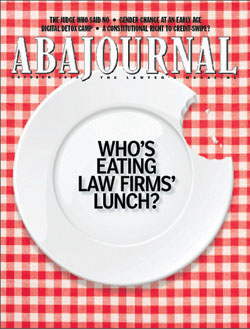Letters: Attorney vs. Automaton

ATTORNEY VS. AUTOMATON
Regarding “Who’s Eating Law Firms’ Lunch?” October: Technology will annihilate tradition. Ray Bayley and Lois Haubold are bright cookies and understand that the commoditization of legal work is a done deal. It’s here, it’s happening—they’re embracing it and making money on that reality.
And this isn’t their first startup rodeo, so my guess is that they’re not necessarily envisioning Novus as being around in its current iteration in 10 years. They’ll have made their money and their point and will have moved on to or evolved toward the next low-hanging fruit in the industry. And there’s a lot of it.
We’re not going to be replaced by robots, but automation of some key functions is going to continue to spread and the sophistication of the end-products will advance. It’s scary on one level, fascinating on another. If you’re going to cling to more traditional models of operation, you’d better be prepared to prove value to clients’ bottom line, like down to the cent. I’m not sure a lot of legal practitioners are thrilled at the prospect of possibly having to engage more directly in a sales strategy for their services in order to compete against the machine.
Lisa R. Grube
Washington, D.C.
Here is the basic problem: Ms. Johnston wants her “BigLaw” firm to put their malpractice policy on the line and use a document review contractor that is not under their supervision and control.
It may be that BigLaw and many of the rest of us should be buying software to more efficiently do document review. However, those of us who have been at this a while know there is a reasonable probability that the next time the outside contractor will miss the “silver bullet” document. They never publicize their misses or the claims paid when they miss.
If next time her firm misses the silver bullet and her clock gets cleaned, will she sue for malpractice or never hire the firm again?
Everyone wants a competent lawyer and wants them to be responsible, but when it comes to paying for that they complain. Ms. Johnston’s company gets into lawsuits because of something they did or did not do, not because of something their lawyer(s)—BigLaw or otherwise—did or did not do; i.e., the lawyers did not make the mess.
Paid, unpaid, overpaid or underpaid, a lawyer has to exercise their “independent professional judgment.” Outside document reviewers, unless they want to (and are licensed to) sign on as co-counsel in the case (and I don’t see any wanting to do that!) are not able to do that.
If my malpractice carrier is on the hook, I must control the factual preparation of the case, including all document reviewers, exhibit preparers, etc. “My people” may miss something, but if they do it’s my professional problem.
T. Rankin Terry Jr.
Fort Myers, Fla.
MORE FROM THE DEFENSE
In “When the Defenders Are the Plaintiffs,” October, Scott Burns, executive director of the National District Attorneys Association, purportedly points out that the prosecutors are also suffering from this money crunch.
What he (willfully?) omits is that prosecutors have a built-in investigative arm—the police departments—and have on-staff resources for expert reports and testimony not included in their budgets (psych professionals, chemistry labs, et cetera). Court-appointed counsel has to ask the court for money for each of these things, and may not get approved in the judge’s discretion, even as the prosecutors have chosen in their discretion to create this caseload.
I’ve been doing criminal defense work for a number of years now, and I have never heard a prosecutor say, “Well, we wanted to bring in a psych expert and investigate these other three witnesses, but the court just wouldn’t approve the funds.”
Jay Hurst
Durham, N.C.
CRIME LAB COMPLAINT
As a former North Carolina judge and director of the North Carolina State Crime Laboratory for three years, I am truly disappointed with the misleading portrait of the lab reflected in “Crime Labs Under the Microscope,” September.
First, the crime lab’s adoption of recommendations from the 2010 independent audit is ignored as are numerous other quality control and transparency measures. For example, the lab is accredited under ISO/IEC 17025, the highest international standards applicable to forensic science laboratories. Further, three consecutive independent DNA annual audits have found perfect compliance with rigorous FBI standards.
Every crime lab scientist undergoes annual proficiency testing provided by a separate agency with 100 percent accuracy required. All eligible scientists currently performing casework have become independently certified. Suggestions that crime lab operations are affected by a prosecutorial bias or—excluding decades-old reporting language—were questioned by the audit are flatly contradicted by the audit report itself, belied by ongoing procedural developments, and are just dead wrong. North Carolina crime lab forensic scientists follow precise testing standards, record the results accurately, and let the chips fall where they may.
Joseph R. John Sr.
Raleigh, N.C.



